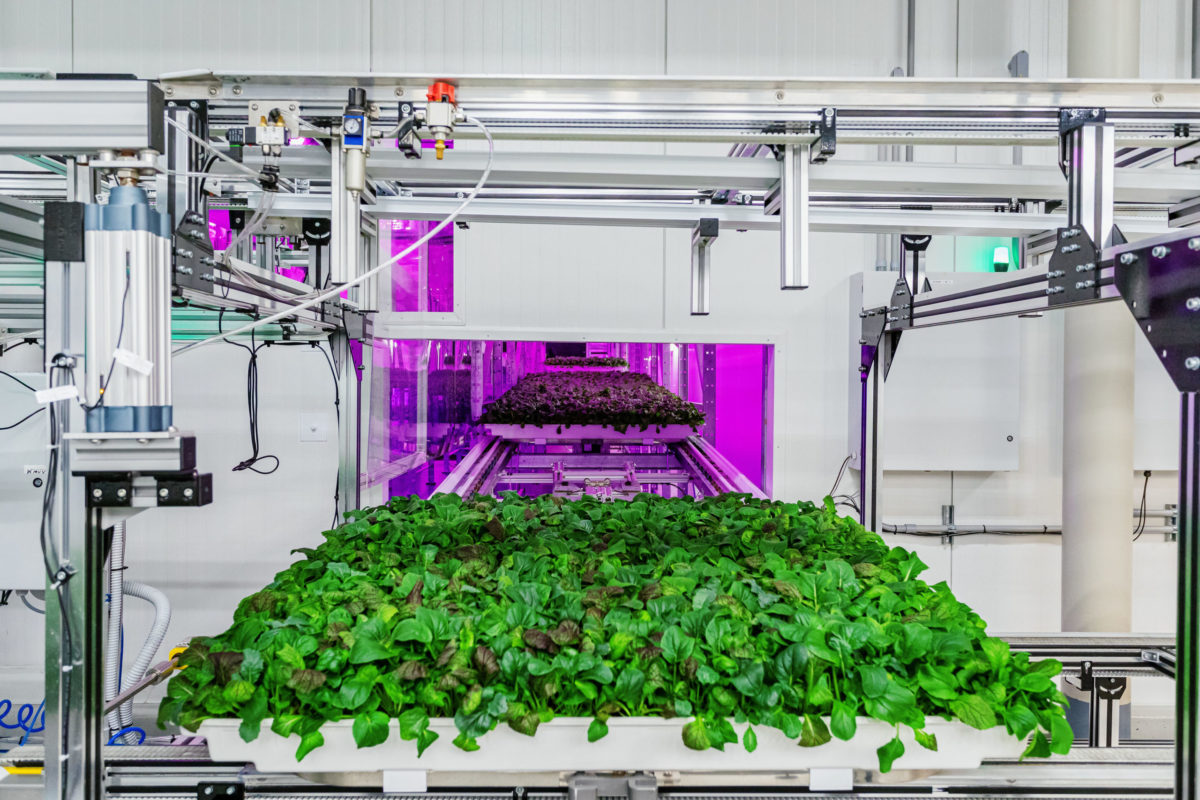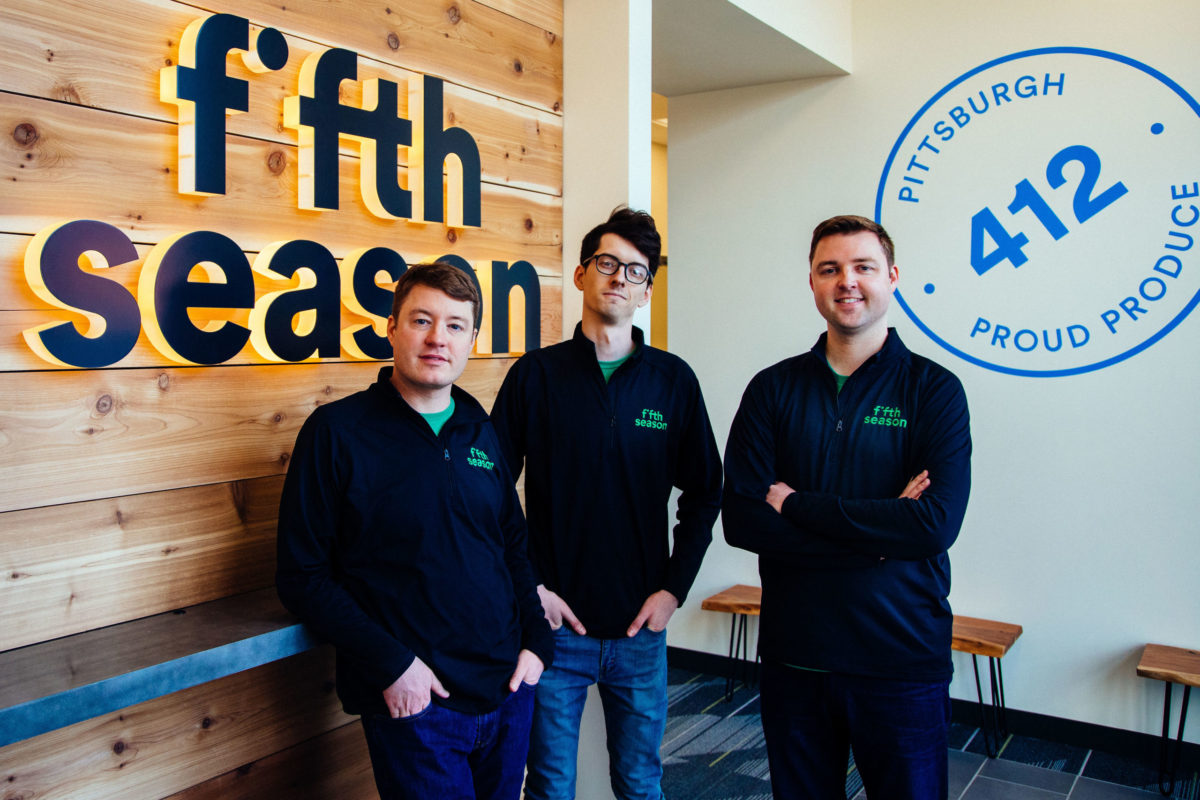Pittsburgh companies are bringing their robotics prowess to farming.
Over the last few years, there’s been a growing presence of agricultural tech companies in the city, and a leader in that pack is Fifth Season — a robotic vertical farming company with their main farming facility sitting right next to the U.S. Steel-owned Edgar Thomson Steel Works in Braddock. Since launching in 2015 when its three founders met at Carnegie Mellon University, the South Side-headquartered Fifth Season is bringing fresh produce directly to stores and individuals across the region.
The inspiration for the technology came out of a long history of greenhouse innovation, as Brac Webb, one of Fifth Season’s three cofounders who also acts as the company’s chief technology and chief operating officer, told Technical.ly. Early iterations of greenhouses that relied on sunlight and ventilation through windows and fans were one of the first forays into what Webb called controlled environment agriculture, or the idea that a greenhouse allows growers to manage crop conditions in a more direct way, “smoothing out the climate,” he said.
With new advancements in the use of LED lights and soilless plant production methods like hydroponics, an almost fully controlled indoor growing environment became possible.
“So in greenhouses for a while, they understood that, once LEDs came out, it was like, ‘Heck, if we could afford to buy enough of these, perhaps we could just use them and not even need the sun,'” said Webb. “And eventually we hit that inflection point.”
Once LEDs came out, it was like, Heck, if we could afford to buy enough of these, perhaps we could just use them and not even need the sun. And eventually we hit that inflection point.
Fifth Season’s 60,000-square-foot indoor farming facility takes those technology advancements of the last few decades and uses artificial intelligence to automate and optimize the growing process. With no reliance on the sun, Fifth Season operates a vertical farming environment — an arrangement where plants grown with soilless farming techniques are stacked in layers on top of each other — that uses LEDs as its only light source. Automated robotics within the facility are then able to move and shuffle rows of plants around each other as needed, addressing individual crop needs for light, ventilation, climate and other factors with precision.
“We got really good at moving the plants around [according to the] environmental resources and the LED spectrums they want,” Webb said. “So once it’s seeded with an automated seeding machine, it moves around to different environments where it wants to grow. And then it comes out to get harvested and get packed — very automated, very few people in there.”
The controlled growing environment also means that Webb and his team don’t need to use pesticides and herbicides, which can both decrease the shelf life of crops. The supply chain from the Braddock facility to local customers is much shorter too, so there’s little delay in getting the harvested plants to consumer fridges. Once there, Webb said a bag of Fifth Season’s leafy greens can stay fresh up to two weeks, instead of starting to wilt only a few days like many current grocery store options.

Beyond saving labor costs that come with traditional outdoor farming over hundreds and thousands of acres, Fifth Season’s approach to farming prioritizes sustainability. By using robotics and automation to optimize its combined use of hydroponics and vertical farming consumes 97% less land and 95% less water, Webb said. There’s little waste involved in the process too, and no risk of soil runoff, as soil isn’t required in hydroponics. The growing media used for root and stem support in hydroponics are composted.
But there are energy challenges associated with LEDs, especially at the volume required for the kind of vertical farming Fifth Season does. Webb said the company is acutely aware of this impact and does its best to optimize energy usage in addition to other factors. He mentioned that the Braddock facility has a microgrid onsite, and that Fifth Season will soon install solar panels to offset some of the LED energy drain with a clean and renewable source.
Can sustainable farming more efficiently feed the world?
Even with more sustainable power though, this new approach to farming isn’t quite ready to resolve growing food supply strains yet. Right now, Fifth Season’s technology is mostly limited to leafy green and herbs, which Webb openly acknowledges as an imperfect solution — “you’re not going to feed the world on spinach alone.”
Still, he has hope that with continued innovation in the agricultural tech field, crops like tomatoes and strawberries might soon be easier to grow in the company’s facility, which will in turn lead to possibilities for even more crops. Once there, “we will get to solving [food supply strains] with sustainable farming and more efficiently feed the world,” Webb said.
Right now, Fifth Season operates both a direct-to-consumer subscription service offering salads and greens grown at their Braddock facility, as well as business-to-business arrangements with local retailers like Giant Eagle, Coffee Tree Roasters and the East End Food Co-op.
Looking to capitalize more on the customer growth it saw during the pandemic — D2C business increased for several food-focused companies in the mid-Atlantic — the venture-backed Fifth Season has plans to build another farm in the near future, though Webb declined to disclose the next location. Beyond that expansion, the company is also hiring for several positions in sales, marketing and operations.
“We’re hiring faster right now than we ever have,” said Webb. “We’re hitting our growth spurt and it’s super exciting.”







